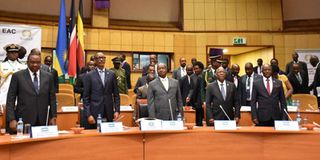Covid crisis offers window to reset EAC integration agenda

East African Community Heads of State Paul Kagame (Rwanda), Yoweri Museveni (Uganda), Uhuru Kenyatta (Kenya), John Magufuli (Tanzania) and Gaston Sindimwo (Burundi VP) at a past EAC summit.
What you need to know:
- Tension amongst the member-states, largely due to competing national interests, is not new.
- Historically, EAC has suffered setbacks from inadequate commitment by member-states.
Regional integration has long been seen as a cure for social, economic, and political imbalances, especially as weaker states benefit from the advantages derived from the large economies of scale.
However, a scan of such projects in the pre-pandemic period reveals that the anti-integration narratives were slowly gaining traction. From Trump’s ‘America First’ approach to the 2016 Brexit, disintegration talk has, inevitably, been thrust to the top of the agenda of academic and policy discourses.
Integration experiments in Africa, including the East Africa Community (EAC), have not been insulated from such sentiments either. These nationalistic tendencies have grown two-fold during the Covid-19 pandemic with nations opting to ‘look inward’ as opposed to pursuing a cooperationist approach to addressing the immediate exigencies of the pandemic and other pressing issues.
So, has the pandemic enhanced or weakened the responsiveness of the region’s institutions to crises?
Tension amongst the member-states, largely due to competing national interests, is not new. While the political idea of establishing the EAC has widespread support, historically, it has suffered setbacks from inadequate commitment by member-states.
The ghosts of the EAC I (which collapsed in 1977) haunt the promising nascent experiment, EAC II. The disjointed or uncoordinated response to the pandemic across the region has exposed deep-seated fissures that warrant immediate redress.
Rethinking direction
The EU’s Covid-19 experience show cooperation is vital ‘in sickness and in health’. It exposed just how dependent member-states and institutions are on one another’s effectiveness.
The EU Commission has been coordinating joint European procurement of personal protective equipment (PPEs) and, recently, procurement of vaccines and also enhancing the powers of the European Health Emergency Response Authority in stockpiling medical supplies.
The EU has lessons for the EAC in as far as rethinking the direction of the bloc is concerned. Top on the list is, by jointly testing for the coronavirus, joint implementation of the health and hygiene protocols, as well as vaccine procurement and collaboration on enhancing health emergency preparedness, the EAC would benefit a lot from collective action.
This is besides benefits such as economies of scale, improved bargaining leverage, free and coordinated movement of goods, services, capital and labour, which are key fulcrums upon which the customs union and common market protocols are founded.
The disruptions to global supply chains have necessitated bolstering of regional production networks to enhance the self-sufficiency of states and regional blocs.
The EAC, like its counterparts, especially in the Global South, should strengthen its own to deepen integration, and reducing dependence on global supply chains, which is out outside its control.
As a starting point, member-states can refashion their industrialisation strategies to reflect the spirit of the EAC Industrialisation Strategy launched in 2012. The point here is, EAC integration should come as a precursor to continent-wide projects like the African Continental Free Trade Area (AfCFTA).
In a post-pandemic context, EAC leaders should prioritise regionalisation over parochial nationalism. That is why President Uhuru Kenyatta’s promise “to strengthen partnerships to enhance intra-EAC connectivity and ensure sustainable implementation of projects and programmes in productive sectors” as he took over the bloc’s chairmanship in late February is a good sign for a stronger EAC.
Mr Kwinga is a political scientist. [email protected].





